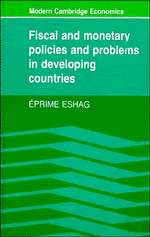Book contents
- Frontmatter
- Contents
- List of tables and chart
- Series preface
- Preface
- List of abbreviations
- 1 THE MEANING AND THE STRATEGY OF ECONOMIC DEVELOPMENT
- 2 THE SCOPE AND ROLE OF FISCAL AND MONETARY POLICIES
- 3 FINANCING ECONOMIC DEVELOPMENT (1) DOMESTIC SAVINGS
- 4 FINANCING ECONOMIC DEVELOPMENT (2) FOREIGN CAPITAL
- 5 THE PATTERN OF INVESTMENT
- 6 INTERNAL AND EXTERNAL EQUILIBRIUM
- Index
Preface
Published online by Cambridge University Press: 01 June 2011
- Frontmatter
- Contents
- List of tables and chart
- Series preface
- Preface
- List of abbreviations
- 1 THE MEANING AND THE STRATEGY OF ECONOMIC DEVELOPMENT
- 2 THE SCOPE AND ROLE OF FISCAL AND MONETARY POLICIES
- 3 FINANCING ECONOMIC DEVELOPMENT (1) DOMESTIC SAVINGS
- 4 FINANCING ECONOMIC DEVELOPMENT (2) FOREIGN CAPITAL
- 5 THE PATTERN OF INVESTMENT
- 6 INTERNAL AND EXTERNAL EQUILIBRIUM
- Index
Summary
The main purpose of this book is to examine the potential of fiscal and monetary policies for promoting economic development in less developed countries (LDCs) and to assess the extent to which this potential is exploited. The book is confined to what have come to be known as developing ‘market’ economies; it excludes all ‘socialist’, or ‘centrally-planned’, countries. There are some one hundred and fifty countries and territories variously designated as ‘developing’, ‘less developed’, or ‘underdeveloped’ market economics. They cover virtually all of Africa, Central and South America, the Middle East and a large part of Asia. Their aggregate population, estimated at over two billion in 1980, accounts for about three-fourths of the world population outside the centrally-planned countries.
The so-called developing world thus consists of a large number of heterogeneous countries, differing significantly from one another in such important respects as area, population, resource endowment, stage of development, per capita income, as well as in social and political institutions. This clearly implies that the development problems encountered by the various countries and the fiscal and monetary policies used to deal with them are by no means identical and are far too numerous to be examined, even in broad outline, in this short monograph. Because of this, we have confined the scope of the book to a broad analysis of the use of fiscal and monetary policies in resolving certain basic problems which are shared, in varying degrees, by almost all developing countries.
- Type
- Chapter
- Information
- Publisher: Cambridge University PressPrint publication year: 1984

